
12 minute read
Military
Revolutionary traitor Benedict Arnold writes out and certifies an oath of allegiance for a fellow officer: “I will to the Utmost of my Power, support, maintain & defend the said United States against the said George the third”
220. Benedict Arnold Autograph Document Signed.
Revolutionary War–dated ADS, signed “B. Arnold, M. Genl.,” one page, 7.25 x 12.25, September 17, 1778. As senior officer in command at Philadelphia, Arnold writes and certifies an oath of allegiance for his fellow officer, Brig. Gen. Edward Hand, an Irish-born Pennsylvanian physician remembered for his service during the siege of Yorktown, and who would be appointed adjutant general to Gen. George Washington in 1781. In full: “I Edward Hand Brigadier Genl. do acknowledge the United States, to be free, Independent & Sovereign States, and declare that the People thereof owe no Allegiance or Obedience to George the third, King of Great Britain, and I renounce, refuse & abjure any Allegiance or Obedience to him;—& I do swear that I will to the Utmost of my Power, support, maintain & defend the said United States against the said George the third, his Heirs and Successors, and his or their Abettors, Assistants & Adherents and will serve the said United States in the Office of Brigadier Genl. which I now hold, with Fidelity, according to the best of my Skill & Understanding.” At the bottom, Arnold, commanding the American garrison at Philadelphia, certifies his handwritten document: “Sworn before me, Philad’a, Sep’r 17th 1778, B. Arnold, M. Genl.” In very good to fine condition, with two tiny areas of paper loss to the upper left corner, and irregular toning and staining affecting only appearance.
On February 3, 1778, the Continental Congress resolved that all civil and military officers should affirm an oath ‘of allegiance and abjuration,’ worded as in the present example. Arnold had sworn his own oath of allegiance on May 30, 1778, using a partly-printed form with the same text; as evinced by this document, handwritten manuscripts were substituted in cases where the form was not available. When the British withdrew from Philadelphia in June 1778, George Washington appointed Arnold as military commander of the city. While in Philadelphia, he met and married Peggy Shippen, a socialite from a Loyalist family, who would serve as a go-between in his correspondence with British intelligence officer John André. In September 1780, Arnold’s plot to surrender the key Continental Army outpost at West Point was exposed and he fled to New York, where he received a commission as a brigadier general in the British Army. A remarkable handwritten oath of allegiance from the pen of America’s most infamous traitor.
Past sales history: Christie’s, Printed Books and Manuscripts, May 29, 1998. Starting Bid $2500
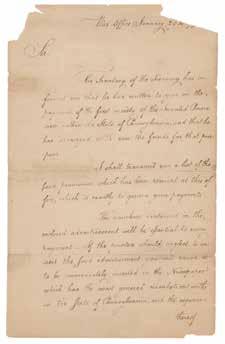
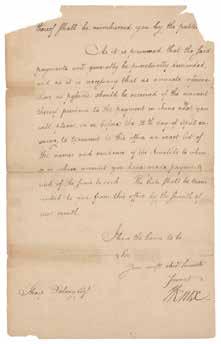
221. Henry Knox Letter Signed. LS as Secretary of War, signed “H. Knox,” one page both sides, 7.75 x 12.5, January 29, [1790]. Official War Office letter to Revolutionary War veteran Sharp Delany, who was appointed by George Washington as first Collector of Customs in Philadelphia. In part: “The Secretary of the Treasury has informed me that he has written to you on the payment of the first moiety of the Invalid Pensioners within the State of Pennsylvania, and that he has arranged with you the funds for that purpose.” In very good condition, with edge tears and paper loss, and old tape repairs to nearly complete separations along very fragile horizontal folds. Starting Bid $200
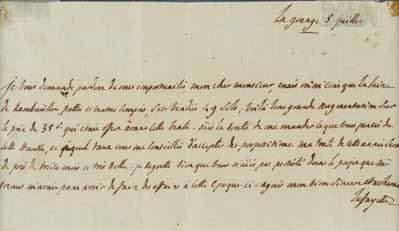
222. Marquis de Lafayette Autograph Letter Signed. ALS in French, signed
“Lafayette,” one page, 5.5 x 3.25, July 5, 1811. A handwritten letter addressed from “La grange,” in part (translated): “The wool from Rambouilles (legs and sides included) has been sold 49 Sols. This is a big increase over the price of 35s, which was offered before that sale. Kindly let me know what you think of this increase, and at what rate you advise me to accept proposition.” Includes the original mailing envelope addressed by Lafayette. Framed with an engraved portrait (bearing a facsimile autograph) to an overall size of 11 x 24.75. In very good to fine condition, with old tape stains to the top corners. Starting Bid $200
Fresh off his “surrender in Apr. ‘65,” Lee pens a commendation for a former Confederate spy
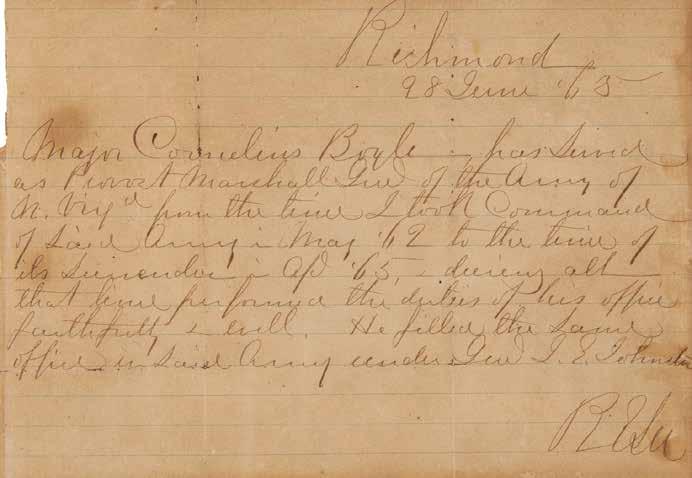
223. Robert E. Lee Autograph Letter Signed.
Spectacular ALS signed “R. E. Lee,” one page, 7.75 x 5.75, June 28, 1865. Addressed from Richmond, Lee pens a handwritten letter of commendation two-and-a-half months after his surrender to Grant. In full: “Major Cornelius Boyle has served as Provost Marshal Genl. of the Army of N. Virg. From the time I took command of said army in May ‘62 to the time of its surrender in Apr. ‘65, during all that time performed the duties of his office faithfully & well. He filled the same office in said Army under Genl. J.E. Johnston.” In very good to fine condition, with some light staining, and toning from prior display. As part of the surrender meeting held between Lee and Grant on April 9, 1865, it was stipulated that certain Confederate spies were not allowed access to their private homes. As such, the abovementioned Cornelius Boyle was denied entry into the city of Washington and was not able to regain possession of his confiscated land due to his espionage activities during the war. His family lost everything after the war, and this letter of commendation from General Robert E. Lee may have been for the purpose of reestablishing himself professionally. Starting Bid $1000
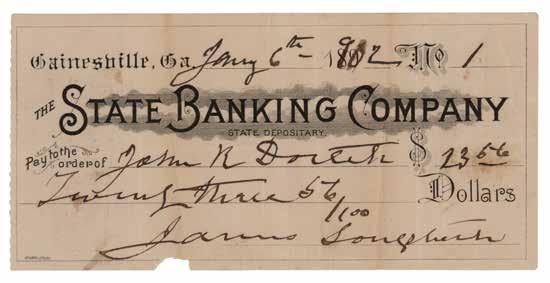
224. James Longstreet Signed Check. Confederate general (1821–1904) who distinguished himself at Bull Run, Fredericksburg, and Chickamauga. The State Banking Company check, 6.25 x 3, filled out and signed by Longstreet, “James Longstreet,” payable to John R. Dortch for $23.56, January 6, 1902. In fine condition, with a chip to the bottom edge. Starting Bid $200
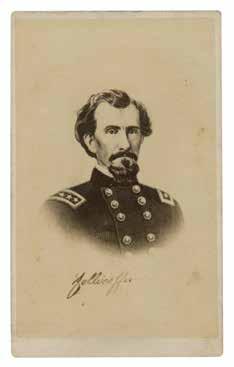
ate brigadier general (1812-1862) who was killed in action at the Battle of Mill Springs, making him the first Confederate general to die in the Western Theater. Rare 2.5 x 4 carte-devisite photo bearing an artistic portrait of Felix Zollicoffer in his military uniform, signed in ink, “Zollicoffer.” In fine condition. Starting Bid $200 227. Douglas MacArthur Signed Photograph. Vintage
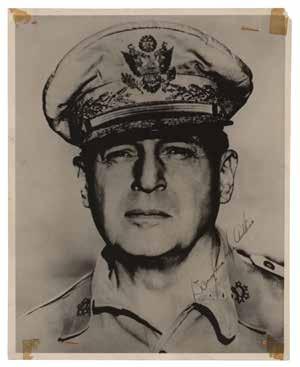
matte-finish 7.75 x 9.75 head-and-shoulders portrait of the American five-star general, signed nicely in fountain pen by Douglas MacArthur. In very good to fine condition, with slight rippling, light silvering to the darker areas of the image, and staple holes and old tape to the corners; the peripheral flaws could be matted out if so desired. Starting Bid $200
A month before his wedding, “Armstrong” requests an old classmate “to act as groomsman”
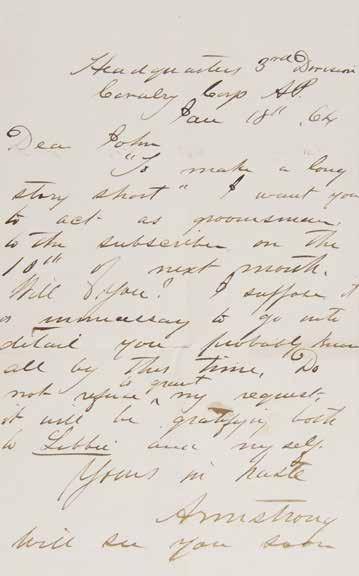
226. George A. Custer Autograph Letter Signed. Civil
War-dated ALS signed “Armstrong,” one page, 5 x 8, January 18, 1864. Addressed from “Headquarters 3rd Division, Cavalry Corp AP,” a handwritten letter to his friend John McClelland Bulkley, a former classmate of Custer’s at the Boys and Young Men’s Academy, in full: “‘To make a long story short’ I want you to act as groomsman to the subscriber on the 10th of next month. Will you? I suppose it is unnecessary to go into detail you probably know all by this time. Do not refuse to grant my request it will be gratifying both to Libbie and myself. Yours in haste.” Custer adds at the end, “Will see you soon.” In fine condition, with a small old repair to a short fold split. Accompanied by the original mailing envelope. Fourteen months after they formally met, George A. Custer married Elizabeth Clift Bacon on February 9, 1864. A rare and intimate letter to one of his oldest allies made all the more coveted for its special request and for Custer’s uncommon middle name signature, used sparingly for close friends and family. Starting Bid $1000
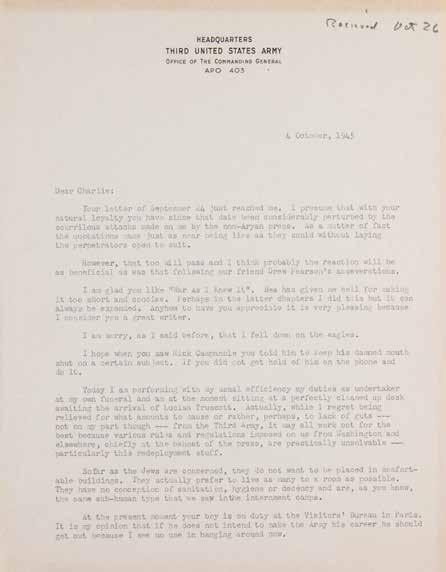
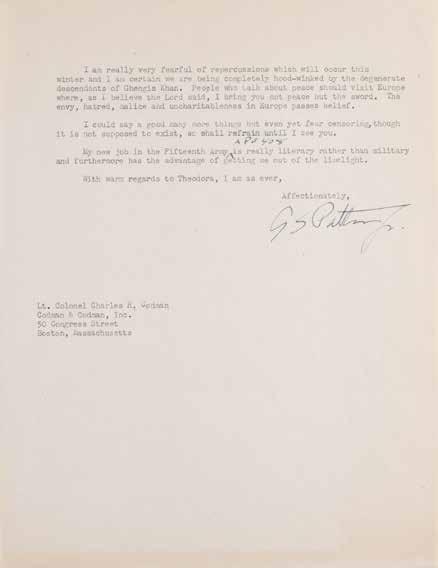
Three days before being relieved of Third Army command, a disillusioned Patton attacks “the non-Aryan press” and alludes to “the same sub-human types that we saw in the internment camps”
661. George S. Patton Typed Letter Signed. TLS signed
“G. S. Patton, Jr.,” two pages, 8.25 x 10.5, Headquarters, Third United States Army, Office of the Commanding General letterhead, October 4, 1945. An astoundingly frank and revealing letter to his former aide, Lt. Col. Charles R. Codman, exposing Patton’s isolation and depression following the end of the war in Europe, and revealing a bitter anti-Semitism. At this time, General Patton, who not long before had been instrumental in securing the Allied victory in Europe, was profoundly out of favor with both his military superiors and the civilian press corps. Critics and many former colleagues were shocked by Patton’s insinuation that Schutzstaffel (or SS) troops were typically no different from conscripts in other armies and by his dismissive treatment of Displaced Persons. After a combative press conference on September 22nd, stories appeared in a number of stateside newspapers blaming Patton for the appalling conditions at many camps for Displaced Persons, many of whom were Jews. The press also reported that General Eisenhower ordered Patton to improve the camps under his area of command and also ordered him to attend a Yom Kippur service. A week after the press conference, on September 29th, Ike transferred Patton to a minor post with the Fifteenth Army in Bad Nauheim.
In this letter, Patton reveals his anger and frustration to his devoted aide. “I presume that with your natural loyalty you have been considerably perturbed by the scurrilous attacks made on me by the non-Aryan press. As a matter of fact the quotations came just as near being lies as they could without laying the perpetrators open to suit.” Patton sees better days ahead, though, as he indicates with an allusion to the controversial journalist who first reported Patton’s slapping of hospitalized soldier Charles Kuhl: “However, that too will pass and the reaction will be as beneficial as was that following our friend Drew Pearson’s asseverations.”
After apologizing for not being able to wrangle Codman a promotion to full colonel (“I am sorry, as I said before, that I fell down on the eagles”), Patton describes his situation as he prepares to move to his new assignment. His first comment in this paragraph, though, could apply to the recent management of his career as a whole: “Today I am performing with my usual efficiency my duties as undertaker at my own funeral and am at the moment sitting at a perfectly cleaned desk awaiting the arrival of Lucian Truscott. Actually, while I regret being relieved for what amounts to cause or rather, perhaps, to lack of guts—not on my part though—from the Third Army, it may all work out for the best because various rules and regulations imposed on us from Washington and elsewhere, chiefly at the behest of the press, are practically unsolvable—particularly this redeployment stuff.”
Addressing the question of the state of the camps for Displaced Persons, Patton does not moderate his language. “So far as the Jews are concerned, they do not want to be placed in comfortable buildings. They actually prefer to live as many to a room as possible. They have no conception of sanitation, hygiene or decency and are, as you know, the same sub-human types that we saw in the internment camps.”
After advising that Codman’s son get out of the Army unless he intends on making it his career, Patton turns, with characteristic candor, to the political implications of the situation in Europe, especially as regards the Soviet Union. “I am really very fearful of repercussions which will occur this winter and I am certain we are being completely hoodwinked by the degenerate descendants of Genghis Khan. People who talk about peace should visit Europe, where, as I believe the Lord said, I bring you not peace but the sword. The envy, hatred, malice and uncharitableness in Europe passes belief.”
In closing, Patton observes, “I could say a good many more things but even yet fear censoring, though it is not supposed to exist, so shall refrain until I see you. My new job in the Fifteenth Army is really literary rather than military and has the advantage of getting me out of the limelight.” Patton would not see Codman again; on December 9th, the former was involved in a wreck of military vehicles and died of his injuries 12 days later. In fine condition. Accompanied by a custom beige clothbound presentation folder with slipcase.
Many theories have been offered for Patton’s erratic behavior and statements near the end of his life. After the Pacific War was won, Patton famously noted in his diary, ‘Yet another war has come to an end, and with it my usefulness to the world.’ One biographer, Carlo D’Este, wrote that ‘it seems virtually inevitable…that Patton experienced some type of brain damage from too many head injuries,’ including a nasty polo accident in 1936. But in The Pattons: A Personal History of an American Family, the General’s grandson, Robert H. Patton, stated, ‘The injection of anti-Semitism into his perception of the political dynamic of the occupation signaled his ultimate loss of moral bearings.’ A dark and disturbing letter written three days before Patton was officially relieved of command of the Third Army. Starting Bid $5000

228. George S. Patton Signature - PSA NM 7. Ink signature, “G. S. Patton, Jr., South Hamilton,” on an off-white 3.25 x 1.5 slip. In very fine condition. Encapsulated in a PSA/DNA authentication holder, grading the autograph as “NM 7.” Starting Bid $200
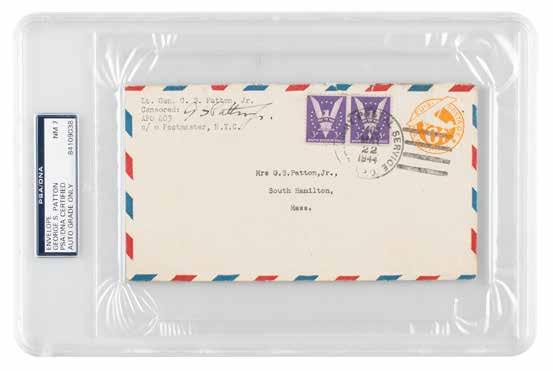
229. George S. Patton Signed Envelope - PSA NM 7. World War II–dated airmail envelope, 6.75 x 3.75, addressed to “Mrs. G. S. Patton, Jr., South Hamilton, Mass.,” and signed as a censor in the upper left, “G. S. Patton, Jr.” Postmarked on May 22, 1944, roughly two weeks before D-Day. In fine condition. Encapsulated and graded by PSA/DNA as “NM 7.” Starting Bid $200






